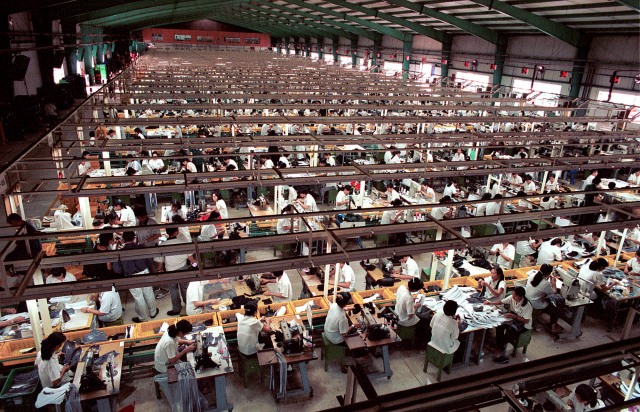My favorite person and big thinker discovered over the last couple of years has to be Deirdre McCloskey. The clear and convincing manner in which she writes as well as the almost inhuman way in which she has command of economics, literature, history, philosophy, religion, sociology, to name but a mere few, makes her defense of free markets, open societies, equality of the law and opportunity (as opposed to equality of outcomes) palpable and a tremendous delight to read. I have posted elsewhere detailing some of the key ideas in her latest book, Bourgeois Equality, but for those who want a Cliff’s Notes version, fortunately McCloskey has provided it in the form of a New York Times op-ed in what Economist Dan Mitchell has called “the most compelling article of 2016” in his International Liberty blog.
McCloskey provides a helpful reminder that growth and lifting people out of poverty, not inequality per se, is what our focus should be on:
….will we really help the poor by focusing on inequality?
Anthony Trollope, the great English novelist, gave an answer in “Phineas Finn” in 1867. His liberal heroine suggests that “making men and women all equal” was “the gist of our political theory.” No, replies her radical and more farseeing friend, “equality is an ugly word, and frightens.” A good person, he declares, should rather “assist in lifting up those below him.” Eliminate poverty, and let the distribution of wealth work.
Economic growth has been accomplishing exactly that since 1800. Equality in the most important matters has increased steadily, through lifting up the wretched of the earth. The enrichment in fundamentals for the poor matters far more in the scheme of things than the acquisition of more Rolexes by the rich.
What matters ethically is that the poor have a roof over their heads and enough to eat, and the opportunity to read and vote and get equal treatment by the police and courts. Enforcing the Voting Rights Act matters. Restraining police violence matters. Equalizing possession of Rolexes does not.
Going further, McCloskey explains the futility of the focus on equality of outcomes:
A practical objection to focusing on economic equality is that we cannot actually achieve it, not in a big society, not in a just and sensible way. Dividing up a pizza among friends can be done equitably, to be sure. But equality beyond the basics in consumption and in political rights isn’t possible in a specialized and dynamic economy. Cutting down the tall poppies uses violence for the cut. And you need to know exactly which poppies to cut. Trusting a government of self-interested people to know how to redistribute ethically is naïve.
Another problem is that the cutting reduces the size of the crop. We need to allow for rewards that tell the economy to increase the activity earning them. If a brain surgeon and a taxi driver earn the same amount, we won’t have enough brain surgeons. Why bother? An all-wise central plan could force the right people into the right jobs. But such a solution, like much of the case for a compelled equality, is violent and magical. The magic has been tried, in Stalin’s Russia and Mao’s China. So has the violence.
From there, McCloskey draws a creative conclusion on why people are sentimental and psychologically drawn to socialism. She observes that people make connections about central planning and sharing learned in the home and from there taking an illogical leap that government enforced sharing is therefore of the same moral equivalence.
Many of us share socialism in sentiment, if only because we grew up in loving families with Mom as the central planner. Sharing works just fine in a loving household. But it is not how grown-ups get stuff in a liberal society. Free adults get what they need by working to make goods and services for other people, and then exchanging them voluntarily. They don’t get them by slicing up manna from Mother Nature in a zero-sum world.
McCloskey lands with the defense of and the superiority of the classical liberal model:
It is growth from exchange-tested betterment, not compelled or voluntary charity, that solves the problem of poverty. In South Korea, economic growth has increased the income of the poorest by a factor of 30 times real 1953 income. Which do we want, a small one-time (though envy-and-anger-satisfying) extraction from the rich, or a free society of betterment, one that lifts up the poor by gigantic amounts?
We had better focus directly on the equality that we actually want and can achieve, which is equality of social dignity and equality before the law. Liberal equality, as against the socialist equality of enforced redistribution, eliminates the worst of poverty. It has done so spectacularly in Britain and Singapore and Botswana. More needs to be done, yes. Namely, more growth, which is sensitive to environmental limits and will require a proliferation of rich engineers. Let them have their money from devising carbon-fixing techniques and new sources of energy. It will enrich all of us.
To borrow from the heroes of my youth, Marx and Engels: Working people of all countries unite! You have nothing to lose but stagnation! Demand exchange-tested betterment in a liberal society.
Some dare call it capitalism.
While 2016 was indeed a bleak year for classical liberals, represented largely by the political success of the unfrotunate combination of economic populism and economic nationalism/protectionism, McCloskey’s article represents the ideal of a well-articulated defense of classical liberalism/libertarianism that are extemely important – now more so than ever.


